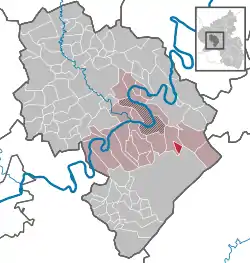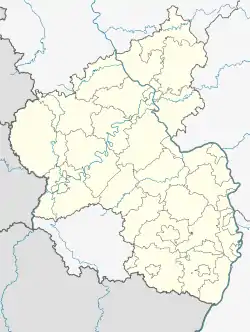Kommen
Kommen is an Ortsgemeinde – a municipality belonging to a Verbandsgemeinde, a kind of collective municipality – in the Bernkastel-Wittlich district in Rhineland-Palatinate, Germany.
Kommen | |
|---|---|
 Coat of arms | |
Location of Kommen within Bernkastel-Wittlich district  | |
 Kommen  Kommen | |
| Coordinates: 49°52′47″N 7°7′43″E | |
| Country | Germany |
| State | Rhineland-Palatinate |
| District | Bernkastel-Wittlich |
| Municipal assoc. | Bernkastel-Kues |
| Government | |
| • Mayor | Gerhard Leyendecker |
| Area | |
| • Total | 2.82 km2 (1.09 sq mi) |
| Elevation | 460 m (1,510 ft) |
| Population (2019-12-31)[1] | |
| • Total | 293 |
| • Density | 100/km2 (270/sq mi) |
| Time zone | UTC+01:00 (CET) |
| • Summer (DST) | UTC+02:00 (CEST) |
| Postal codes | 54472 |
| Dialling codes | 06536 |
| Vehicle registration | WIL |
| Website | www.kommen.de |
Geography
Location
The municipality lies in the northern Hunsrück. The nearest middle centre is Bernkastel-Kues. Kommen belongs to the Verbandsgemeinde of Bernkastel-Kues, whose seat is in the like-named town.
Climate
Kommen lies within the temperate zone.
History
In 922, Kommen had its first documentary mention as Cuminu. Until 1802 it formed a unified municipality with Longkamp.
Politics
Municipal council
The council is made up of 6 council members, who were elected by majority vote at the municipal election held on 7 June 2009, and the honorary mayor as chairman.[2]
Coat of arms
The municipality's arms might be described thus: Argent a chevron reversed gules, the ends in chief and the point at the base, surmounted on each side by a scythe blade of the field, the points to base.
The reversed (that is, upside down) chevron forms a V, which is meant to stand for the village's patron saint, Valentine, and the scythe blades refer to the agriculture that is the villagers’ main livelihood even today.
The arms have been borne since 8 November 1962.[3]
Culture and sightseeing
The village chapel goes back to 1730.
Economy and infrastructure
Public transport in Kommen is integrated into the Verkehrsverbund Region Trier (VRT), whose fares therefore apply. Since September 2008, Kommen has had at its disposal a “youth room”, which was built almost exclusively by the village youth and with help from a few professionals from the municipality.
References
- "Bevölkerungsstand 2019, Kreise, Gemeinden, Verbandsgemeinden". Statistisches Landesamt Rheinland-Pfalz (in German). 2020.
- Kommunalwahl Rheinland-Pfalz 2009, Gemeinderat
- Description and explanation of Kommen’s arms – Go to Die Gemeinde>Wappen.
